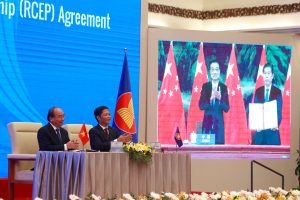
Vietnamese Prime Minister Nguyen Xuan Phuc, left, and Minister of Trade Tran Tuan Anh, right, applaud next to a screen showing Chinese Premier Li Keqiang and Minister of Commerce Zhong Shan holding up a signed RCEP agreement, in Hanoi, Vietnam.
Credit: AP Photo/Hau Dinh
Indonesia’s parliament yesterday passed a law formalizing the country’s membership of the Regional Comprehensive Economic Partnership (RCEP) trade pact, which a senior minister said would allow the country to “storm the international markets.”
With its accession, Indonesia becomes the latest Southeast Asian nation to join the world’s biggest trade bloc. Initially signed in November 2020 by the leaders of 15 Asia-Pacific countries, including all 10 members of the Association of Southeast Asian Nations (ASEAN), the RCEP mega-pact covers nearly a third of the world’s population and a similar proportion of its gross domestic product. In addition to ASEAN, the agreement includes Australia, China, Japan, New Zealand, and South Korea – but not the United States.
According to a Reuters report, Indonesian Trade Minister Zulkifli Hasan told parliamentarians that membership in RCEP would boost Indonesia’s trade and foreign direct investment. He also predicted that it would lift the country’s annual GDP growth by 0.07 percent.
“We describe this agreement as a tollway to enter the global market, and it is time for Indonesia to storm the international markets,” he told parliament yesterday.
The same day, Coordinating Economic Affairs Minister Airlangga Hartarto gave a press briefing with some more specifics about how Indonesia would benefit. He said the trade deal would give Indonesian industries including fisheries, plantation and car manufacturing better access to markets of RCEP member states like China, Japan, and South Korea.
“The RCEP will open up greater opportunities for Indonesia, as it encourages the expansion of regional production networks and regional value chains and provides a better business climate,” Airlangga said, the Jakarta Post reported.
Indonesia becomes the 13th of the 15 signatories to ratify the treaty, with only Myanmar and the Philippines remaining. The treaty entered into force at the start of this year for those nations that had ratified it prior to that point.
First proposed by ASEAN in 2011, RCEP will eliminate up to 90 percent of the tariffs on imports between its signatories within 20 years of coming into effect. It also aims to establish common rules for e-commerce, trade, and intellectual property. In addition to ratifying RCEP, Indonesian parliamentarians yesterday also approved a free trade agreement with South Korea, also signed in 2020.
As Reuters explains, the bilateral pact will see Indonesia and South Korea “eliminate more than 92 percent and 95 percent of tariff lines, respectively.” Indonesia will grant preferential tariffs to support Korean investment in a number of areas, including the country’s nascent electric vehicle and battery industry. The South Korean firms Hyundai Motor Group and LG Energy Solution are already leading investors in the sector.
Indonesia’s formal accession to RCEP is another reminder of the extent to which economic stability and prosperity remain the priority for much of the Asia-Pacific. It also shows how much economics remains the vacuum at the center of the U.S. policy toward nations like Indonesia, which remains centered on containing Chinese ambition and influence by overwhelmingly military means.
The signing of RCEP, and U.S. President Donald Trump’s withdrawal from the U.S.-led 12-nation Trans-Pacific Partnership (TPP) in 2017, have left Washington outside the two largest existing Asian trade agreements. (The 11 other nations have pushed forward with the TPP, now known as the Comprehensive and Progressive Trans-Pacific Partnership.) The creation of the Indo-Pacific Economic Framework, which was unveiled by President Joe Biden earlier this year, was a step in the direction of an economic vision, but the continuing strong domestic political opposition to multilateral free trade deals is likely to see the U.S. lag further behind the economic curve in Asia-(let alone Indo-) Pacific.


